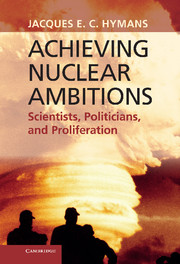Book contents
- Frontmatter
- Contents
- Figures
- Table
- Preface
- Abbreviations
- 1 The puzzle of declining nuclear weapons project efficiency
- 2 A theory of nuclear weapons project efficiency and inefficiency
- 3 Spinning in place
- 4 How did China’s nuclear weapons project succeed?
- 5 Proliferation implications of international civil nuclear cooperation
- 6 Proliferation implications of footloose nuclear scientists
- 7 Empirical extensions
- 8 Lessons for policymakers and directions for future research
- References
- Index
- References
6 - Proliferation implications of footloose nuclear scientists
theory and a case study of Perón’s Argentina
Published online by Cambridge University Press: 05 June 2012
- Frontmatter
- Contents
- Figures
- Table
- Preface
- Abbreviations
- 1 The puzzle of declining nuclear weapons project efficiency
- 2 A theory of nuclear weapons project efficiency and inefficiency
- 3 Spinning in place
- 4 How did China’s nuclear weapons project succeed?
- 5 Proliferation implications of international civil nuclear cooperation
- 6 Proliferation implications of footloose nuclear scientists
- 7 Empirical extensions
- 8 Lessons for policymakers and directions for future research
- References
- Index
- References
Summary
In the previous chapter, I examined the widespread belief that international civil nuclear cooperation policies unintentionally accelerate developing states’ achievement of their nuclear weapons ambitions. I argued that although programs of international civil nuclear cooperation can indeed accelerate the well-managed nuclear weapons projects of Weberian legal-rational states, they can do much less for – and even tend to hamper – the poorly-managed nuclear projects of neo-patrimonial states. In particular, I noted that they can strongly promote nonproliferation by facilitating the debilitating brain drain of scientific and technical workers out of the developing world.
Curiously enough, my emphasis on the nonproliferation-promoting effects of the brain drain is a novel one for the literature, which has instead focused on the proliferation risks caused by the supposed brain drain of scientific and technical talent to, not from, the developing world. Indeed, ever since the early 1990s many analysts have been captivated by the notion that former Soviet nuclear scientific and technical workers might, out of financial desperation or greed, choose to sell their services internationally to the highest bidder, thus providing the “missing link” that transforms scientifically backward countries such as Syria or Libya from mere nuclear hopefuls into real nuclear threats. The United States and other Western governments, as well as non-governmental organizations and the financier George Soros, have also been quite alive to this possibility and created a wide array of aid programs aimed at forestalling the feared potential exodus of top-flight nuclear talent to proliferant states. They have funneled well over a billion dollars to tens of thousands of post-Soviet scientific and technical workers for this specific purpose.
- Type
- Chapter
- Information
- Achieving Nuclear AmbitionsScientists, Politicians, and Proliferation, pp. 203 - 238Publisher: Cambridge University PressPrint publication year: 2012

